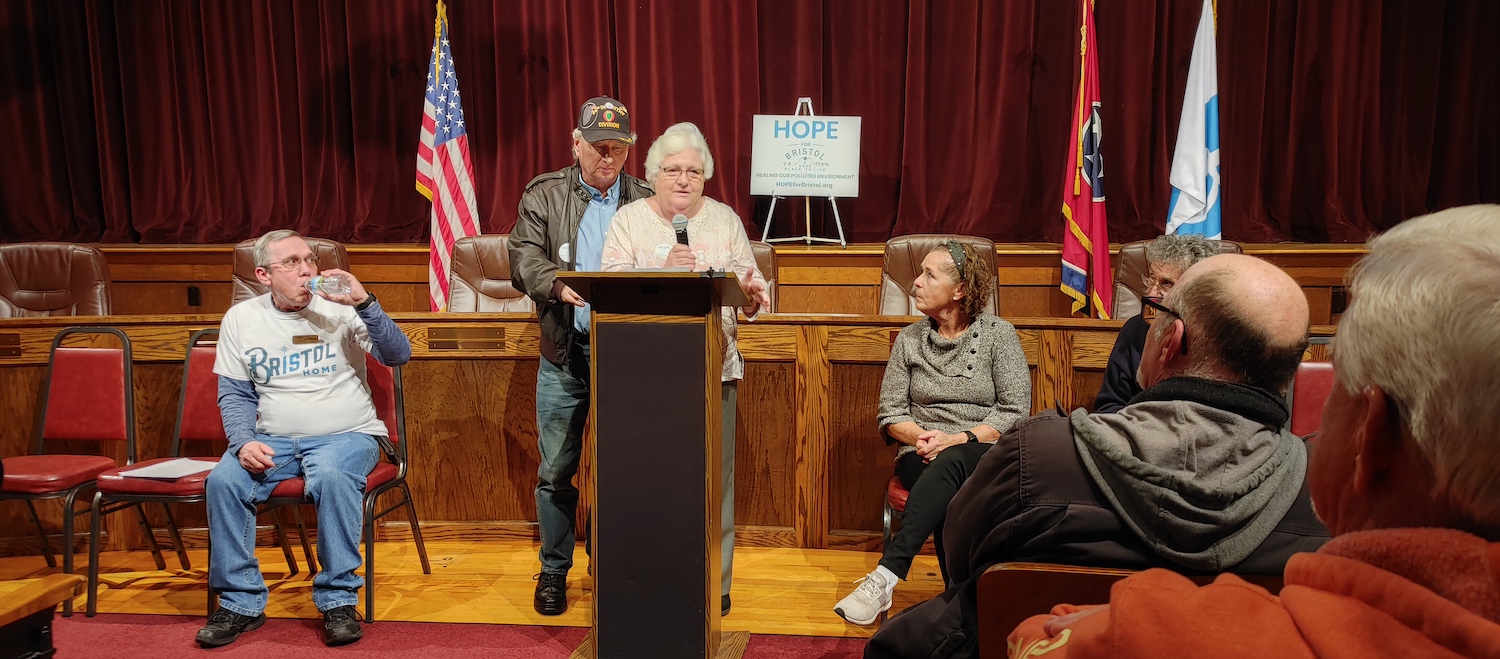
Contributing Writers | March 1, 2023 | No Comments
By Matt Dhillon

Irene and James Nunn of Bristol, Tennessee, speak at the podium about how the landfill has disturbed their lives during HOPE for Bristol’s January 26 press conference. Joel Kellogg, the group’s president, sits on the left and renowned activist Lois Gibbs of The Center for Health, Environment, and Justice sits on the right. Photo courtesy of HOPE for Bristol.
The next steps in the landfill remediation involve drilling deep gas and liquid wells to lower the landfill’s internal temperature, which will release gasses in higher concentrations and temporarily increase the toxicity of the landfill, residents say.
Members of HOPE for Bristol drafted the petition and submitted it to the city on February 14. The grassroots organization was founded in response to the extremely offensive smells and the health complaints that residents have experienced near the landfill, and the group stated that the city’s safety protocol is insufficient.
“Anytime that you have some sort of site remediation activity occurring, you should have perimeter air monitoring set up,” says Becky Evenden, secretary of HOPE for Bristol. “You can have high levels of hydrogen sulfide or ammonia or just high levels of [volatile organic compounds] coming off and they have no monitoring in place now.”
HOPE for Bristol’s petition calls for the city to establish an alert system to inform residents of potential risks from the landfill, to install long-term air monitoring, and provide relief, such as hotel vouchers for residents who need to get away from the fumes. The group is still collecting signatures.
“When they’re drilling there’s so much particulate matter going into the air and you can see it,” Evenden says.
HOPE is also requesting $15,000 from the Bristol, Tennessee, City Council for two 24/7 air quality monitoring devices, according to WJHL. If approved, these devices would contribute to the group’s efforts to continuously monitor airborne pollution around the landfill.
The Bristol group is also slated to receive funding for air quality monitoring through Appalachian Voices, the nonprofit organization that publishes The Appalachian Voice, which received a U.S. Environmental Protection Agency grant in November to deploy 80 air monitoring devices in partnership with 18 organizations, including HOPE.
Residents have reported a range of complaints from respiratory issues and irritation in airways to nausea and fatigue, according to a community symptom survey conducted by HOPE for Bristol. On the crowdsourcing app Smell MyCity, residents have also reported headaches, nausea, burning throat and eyes, nosebleeds and difficulty breathing.
“We have a landfill hangover after a bad night,” Irene Nunn of Bristol, Tennessee said during a January 26 press conference introducing the petition. “We are just lifeless. It takes us forever to get going in the morning and it is really destroying our lives.”
Nunn and her husband have had to leave their home and drive around all night to get away from the smell when it is particularly bad.
Tiffany Rivera, who lives on the same street as the landfill, said she was concerned for her daughters who are 4 and 3 years old.
“I know [Virginia Department of Environmental Quality and Bristol, Virginia City Council] have stated that there’s no short term effects of us breathing benzene and methane gas, but I also have to think, what are the long term effects for my daughters? They’ve lived there their whole lives,” Rivera said.
Residents at the press conference expressed concern that the city council in Bristol, Virginia, is not taking the health risks seriously by referring to the problem only as one of bad smells.
Guest speakers Lois Gibbs, prize-winning founder of The Center for Health, Environment, and Justice, a grassroots environmental advocacy organization, and Stephen Lester, the organization’s toxicologist, related similar experiences addressing toxic waste in Gibbs’ hometown of Love Canal, New York.
She encouraged Bristol residents to be their own advocates in addressing the problems in their landfill.
“You don’t have odors, you have gas,” Gibbs said. “You have toxic emissions. Never use their language. Their language is intended to belittle the problem and the risk.”
The city of Bristol, Virginia, in accordance with the recommendations of a panel of experts convened by the Virginia Department of Environmental Quality, stopped accepting new waste in September 2022. The city is currently installing new gas and leachate extraction wells to reduce the landfill’s internal temperature. In 2023, the city plans to install new gas collection systems and a sidewall odor mitigation system, where most of the odors are thought to be coming from.
Criag Benson, a member of the expert panel, predicts that odor complaints will stop after the sidewall gas collection system is installed, according to reporting by the Bristol Herald Courier. The city intends to permanently cap the landfill when remedial work is done.
The city provides updates on matters related to the landfill online.
Like this content? Subscribe to The Voice email digests